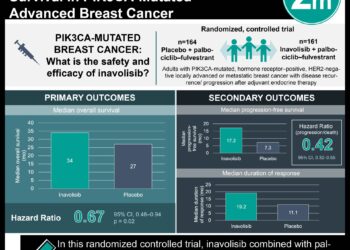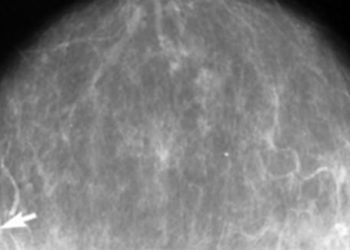Survival in hormone receptor-positive, HER2-negative advanced breast cancer is improved with the addition of capivasertib to fulvestrant therapy
1 .Progression-free survival is improved in patients receiving fulvestrant-capivasertib therapy as compared to fulvestrant-placebo treatment.
2. Overall survival at 18 months is greater in the capivasertib group compared with placebo.
Evidence Rating Level: 1 (Excellent)
Study Rundown: Hyperactivation of the phosphatidylinositol 3-kinase (PI3K)-AKT-PTEN pathway is present in about fifty percent of hormone receptor-positive, human epidermal growth factor receptor 2 (HER2)-negative breast cancers. The key node of this pathway is AKT, which is inhibited by capivasertib. In previous studies, capivasertib was shown to have both antitumour and antiproliferative activity. This study investigated the combination of capivasertib-fulvestrant treatment in patients with advanced hormone receptor-positive, HER2-negative breast cancer who had progressed on previous endocrine therapy, including cyclin-dependent kinase 4 and 6 (CDK4/6) inhibitor therapy. The primary outcome of this study was progression-free survival (PFS) and overall survival (OS) in the complete population of patients in the study, as well as those who had tumours with altered AKT-pathways. Disease progression occurred in 209 patients in the capivasertib group, compared to 273 in the placebo group. The overall median PFS in the capivasertib group was 7.2 months, compared to 3.6 months in the placebo group. For patients with AKT pathway-altered tumours, the median PFS was 7.3 months for those in the capivasertib group, compared to 3.1 months in the placebo group. In the overall population, the 18-month OS was 73.9% in the capivasertib treatment group, compared to 65.0% in the placebo group. In patients who had AKT pathway-altered tumours, the 18-month OS was 73.2% in the capivasertib group and 62.9% in the placebo group. Diarrhea was the most common AE of any grade for patients receiving capivasertib (72.4%, compared to 20.0% of patients in the placebo group). Other AE were rashes (affecting 38.0% of patients in the capivasertib group and 7.1% of patients in the placebo group) and nausea (34.6% of capivasertib patients and 15.4% of placebo patients affected). More severe AEs were reported in the capivasertib group compared to the placebo group (rash in 12.1% vs. 0.3%, respectively; diarrhea in 9.3% and 0.3%, respectively; and hyperglycemia in 2.3% and 0.3%, respectively). Limitations to this study include that randomization occurred without stratification based on AKT pathway alteration resulting in the potential inclusion of patients with more aggressive diseases without allocating them equally between groups. However, this is also a strength as it may reflect clinical heterogeneity. Overall, the results from this study suggest that the addition of capivasertib to fulvestrant for the treatment of hormone receptor-positive, HER2-negative advanced breast cancer improves patient outcomes.
Click to read the study in the NEJM
Relevant Reading: Fulvestrant plus capivasertib versus placebo after relapse or progression on an aromatase inhibitor in metastatic, oestrogen receptor-positive breast cancer (FAKTION):a multicentre, randomised, controlled, phase 2 trial.
In-Depth [randomized controlled trial]: This phase 3, double-blinded and placebo-controlled, randomized control trial was conducted across 193 centres internationally. 708 adult patients were assigned in a 1:1 ratio to receive fulvestrant therapy with either capivasertib (355 patients) or placebo (353 patients) who had progressed on prior aromatase inhibitor, with or without CDK4/6 therapy. There were AKT-pathway alterations in 289 of the total patient population with 313 patients having tumours with no AKT-pathway alterations. There were 106 patients with unknown AKT alteration status. Median PFS in the overall population was 7.2 months for patients receiving capivasertib, as compared to 3.6 months for patients receiving placebo treatment (hazard ratio (HR), 0.60; 95% confidence interval (CI), 0.51-0.71). Median PFS for patients with AKT pathway-altered tumours was 7.3 months in the capivasertib treatment group, and 3.1 months in the placebo treatment group (HR, 0.50; 95% CI, 0.38-0.65). The 18-month OS was 73.9% in the capivasertib treatment group, compared to 65.0% in the placebo group in the overall population (HR, 0.74; 95% CI, 0.56-0.98). The 18-month OS was 73.2% in the capivasertib group and 62.9% in the placebo group for patients who had AKT pathway-altered tumours (HR, 0.69; 95% CI, 0.45-1.05). 72.4% of patients in the capivasertib group reported diarrhea as an AE, compared to 20.0% of patients in the placebo group. Rash was reported in 38.0% of capivasertib patients, compared to only 7.1% of placebo patients. Nausea was present in 34.6% of capivasertib patients and 15.4% of placebo patients.
Image: PD
©2023 2 Minute Medicine, Inc. All rights reserved. No works may be reproduced without expressed written consent from 2 Minute Medicine, Inc. Inquire about licensing here. No article should be construed as medical advice and is not intended as such by the authors or by 2 Minute Medicine, Inc.









